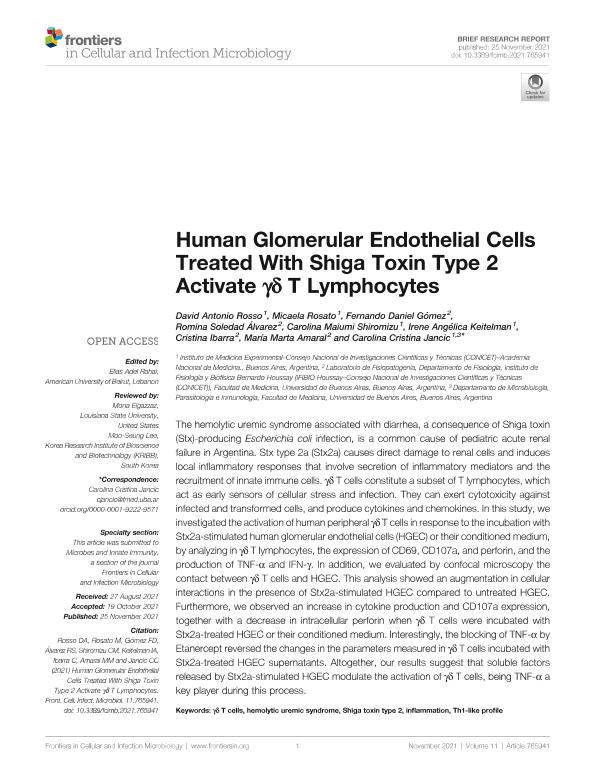Artículo
Human Glomerular Endothelial Cells Treated With Shiga Toxin Type 2 Activate γδ T Lymphocytes
Rosso, David Antonio ; Rosato, Micaela; Gómez, Fernando Daniel
; Rosato, Micaela; Gómez, Fernando Daniel ; Alvarez, Romina Soledad
; Alvarez, Romina Soledad ; Shiromizu, Carolina Maiumi
; Shiromizu, Carolina Maiumi ; Keitelman, Irene Angélica
; Keitelman, Irene Angélica ; Ibarra, Cristina Adriana
; Ibarra, Cristina Adriana ; Amaral, María Marta
; Amaral, María Marta ; Jancic, Carolina Cristina
; Jancic, Carolina Cristina
 ; Rosato, Micaela; Gómez, Fernando Daniel
; Rosato, Micaela; Gómez, Fernando Daniel ; Alvarez, Romina Soledad
; Alvarez, Romina Soledad ; Shiromizu, Carolina Maiumi
; Shiromizu, Carolina Maiumi ; Keitelman, Irene Angélica
; Keitelman, Irene Angélica ; Ibarra, Cristina Adriana
; Ibarra, Cristina Adriana ; Amaral, María Marta
; Amaral, María Marta ; Jancic, Carolina Cristina
; Jancic, Carolina Cristina
Fecha de publicación:
11/2021
Editorial:
Frontiers Media S.A.
Revista:
Frontiers in Cellular and Infection Microbiology
ISSN:
2235-2988
Idioma:
Inglés
Tipo de recurso:
Artículo publicado
Clasificación temática:
Resumen
The hemolytic uremic syndrome associated with diarrhea, a consequence of Shiga toxin (Stx)-producing Escherichia coli infection, is a common cause of pediatric acute renal failure in Argentina. Stx type 2a (Stx2a) causes direct damage to renal cells and induces local inflammatory responses that involve secretion of inflammatory mediators and the recruitment of innate immune cells. γδ T cells constitute a subset of T lymphocytes, which act as early sensors of cellular stress and infection. They can exert cytotoxicity against infected and transformed cells, and produce cytokines and chemokines. In this study, we investigated the activation of human peripheral γδ T cells in response to the incubation with Stx2a-stimulated human glomerular endothelial cells (HGEC) or their conditioned medium, by analyzing in γδ T lymphocytes, the expression of CD69, CD107a, and perforin, and the production of TNF-α and IFN-γ. In addition, we evaluated by confocal microscopy the contact between γδ T cells and HGEC. This analysis showed an augmentation in cellular interactions in the presence of Stx2a-stimulated HGEC compared to untreated HGEC. Furthermore, we observed an increase in cytokine production and CD107a expression, together with a decrease in intracellular perforin when γδ T cells were incubated with Stx2a-treated HGEC or their conditioned medium. Interestingly, the blocking of TNF-α by Etanercept reversed the changes in the parameters measured in γδ T cells incubated with Stx2a-treated HGEC supernatants. Altogether, our results suggest that soluble factors released by Stx2a-stimulated HGEC modulate the activation of γδ T cells, being TNF-α a key player during this process.
Archivos asociados
Licencia
Identificadores
Colecciones
Articulos(IFIBIO HOUSSAY)
Articulos de INSTITUTO DE FISIOLOGIA Y BIOFISICA BERNARDO HOUSSAY
Articulos de INSTITUTO DE FISIOLOGIA Y BIOFISICA BERNARDO HOUSSAY
Articulos(IMEX)
Articulos de INST.DE MEDICINA EXPERIMENTAL
Articulos de INST.DE MEDICINA EXPERIMENTAL
Citación
Rosso, David Antonio; Rosato, Micaela; Gómez, Fernando Daniel; Alvarez, Romina Soledad; Shiromizu, Carolina Maiumi; et al.; Human Glomerular Endothelial Cells Treated With Shiga Toxin Type 2 Activate γδ T Lymphocytes; Frontiers Media S.A.; Frontiers in Cellular and Infection Microbiology; 11; 11-2021; 1-10
Compartir
Altmétricas



